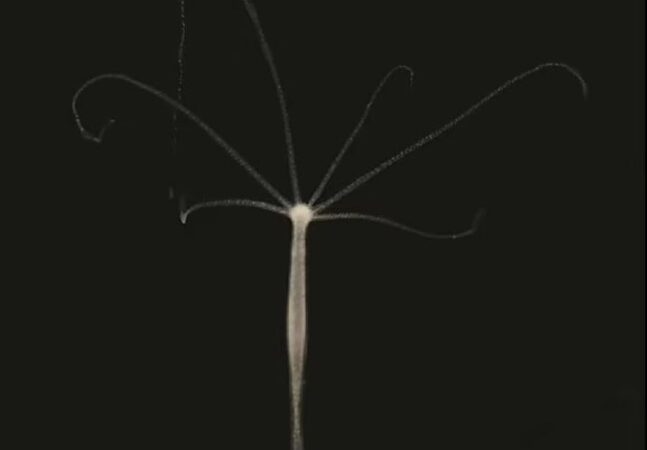A jellyfish-like sea creature with tentacles and the apparent ability to live forever has revealed a disturbing new ability: giving children cancerous tumors. The discovery was made by French government scientists, who warn of the “terrible ecological impact” that could occur if these transmissible cancers spread in the natural environment.
The creature in question is called brown hydra (Hydra oligactis), named after the aquatic monsters of Greek mythology. Although these tumors have only appeared in laboratory conditions so far, similar phenomena have almost led to the extinction of the Tasmanian devil off the coast of Australia in the past decade. Brown Hydras, inhabitants of freshwater environments, have already interested biologists because of their longevity and ability to regenerate.
However, what causes panic is the cancerous tumor that these creatures can pass on to their children. This discovery is published in the journal Proceedings of the Royal Society Bdirected by National Center for Scientific Research (CNRS) from France. According to Sophie Tissot, the evolutionary ecologist who led the study, this type of transmissible cancer can arise as a result of simple overnutrition, contradicting the previous belief that it would not happen such a phenomenon but through a rare combination of special biological factors.
Transmissible cancer and ecological risks
The study revealed that the phenomenon was triggered after the team fed colonies of brown hydras with larval shrimp (Artemia salina). Tissot and his colleagues fed these shrimp to both control and experimental groups, a choice that is similar to human activities, such as aquaculture, which can lead to overpopulation of organisms such as brown hydra in the environment.
The potential for this infectious cancer phenomenon to reproduce outside the laboratory raises environmental concerns. “Human activity can unfortunately create conditions that favor the spread of these cancers,” said Tissot. The researcher mentions how practices such as intensive fish farming in ponds can re- representation of the conditions observed in the study.
This concern is shared by the Missouri Department of Conservation, in the United States, which had already warned of the danger that the proliferation of hydras could cause to aquatic ecosystems. According to the department, when brown hydras reach large numbers in fish farms, they can pose a serious threat to fish larvae, which could be decimating the young population.
Immortal hydras and the spread of cancer
Brown hydras, known for their apparent immortality and ability to regenerate damaged tentacles, have been the subject of study by biologists analyzing freshwater ecosystems. However, this study adds a new dimension to the research by finding that cancerous tumors can be passed down from generation to generation.
Tissot’s team managed to introduce tumors in hydras in less than two months, after four to five generations of the small carnivore to see how the infected tumors were passed on to their children. Through comparison with control groups and analysis of the genetic location of cancer in these organisms, the researchers concluded that the tumors were, in fact, transferred between generations.
The researchers also found that although the tumors could be transplanted, they were often “fragile” and could go into remission if the hydras diet was discontinued. to reduce These data suggest that overeating may be a key factor in the development and spread of tumors.
Effects on human health
The discovery of transmissible cancers in hydras opens up new opportunities for cancer research, but it also raises questions about its potential impact on human health. Biologist Michael Metzger, of the Pacific Northwest Research Institute in Seattle, who was not involved in the study, believes that work with hydras could revitalize cancer research. “It’s a much cheaper system than keeping a thousand Tasmanian devils in a lab and waiting to see if they develop cancer,” said Metzger, who studies the evolution of cancer.
Although he pointed out that the transmissible cancers in hydras are “a little different” from what happens in humans, Metzger emphasized the importance of understanding the diversity of forms that can occur. to take cancer. “A lot can be learned about fundamental aspects of cancer biology from these organisms,” said the researcher.
Scientists believe that this new understanding of transmissible cancer in hydras could help predict and reduce outbreaks of the disease in animal populations. However, Tissot and his team warn that it will be essential to continue to study the impact of human activity on ecosystems in order to prevent the spread of communicable cancers. “If these findings are confirmed in the future, it is essential to consider these aspects when studying ecosystems disturbed by human activity,” the authors wrote in the article.
As brown hydras continue to be studied, their mysterious abilities of regeneration and immortality keep scientists on the lookout for the lessons they may provide about cancer biology and longevity.
2024-09-28 13:30:26
#Scientists #concerned #sea #creature #capable #transmitting #infectious #form #cancer


/origin-imgresizer.eurosport.com/2024/09/28/4045664-82050933-2560-1440.jpg)